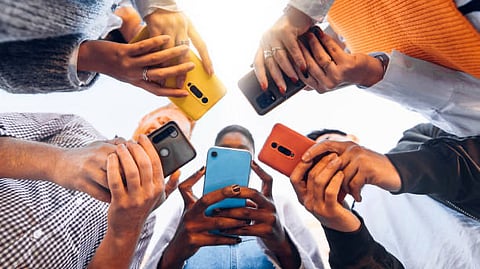

A school in Santiago, Chile, has introduced a first-of-its-kind program in the country that blocks cell phone signals, encouraging students to spend more time interacting with each other in person.
At Lo Barnechea Bicentenario School, located in northern Santiago’s Lo Barnechea district, students are now more likely to be found playing volleyball, basketball, or ping pong, rehearsing dance routines, or simply talking with friends instead of scrolling through Instagram or TikTok, as reported by Associated Press.
“Breaks are very lively now,” said principal Humberto Garrido, adding that the school has also introduced more games and sports activities, including courtyard games, board games in the library, and tournaments for sports like soccer and basketball.
Each morning, students place their phones in special black magnetic-lock cases that block signal detection. The phones remain with the students but can only be unlocked by school staff at the end of the day.
The initiative was launched last month by the Lo Barnechea mayor’s office and is currently being tested with eighth-grade students (ages 13–14). It will soon be expanded to all grades and gradually introduced in other district schools over the next year.
Students say the program has helped them spend more time with friends and take part in school activities.
“I feel freer, I spend more time at recess, I spend more time with my classmates. I play a lot, I play a lot more sports. Before, I used to spend time on my phone, watching TikTok and Instagram,” said 14-year-old José David.
Another student, 13-year-old Francisca Susarte, said the signal-blocking cases are less stressful than completely handing over her phone.
Addressing overuse and distractionAccording to the Organisation for Economic Co-operation and Development's (OECD) 2023 education survey, more than half of Chilean students reported being distracted by digital devices, higher than the international average.
Lo Barnechea mayor Felipe Alessandri said the program is part of a broader effort to tackle learning gaps that worsened during the pandemic.
“Today we have children who are experiencing all kinds of problems: depression, anxiety and obesity,” he said.
Experts warn that excessive smartphone use affects mental health and concentration.
Carolina Pérez, educator and author of Kidnapped by the Screens, said, “These devices have been designed to create addiction. All scientific evidence indicates that for a smartphone to be used in a healthy way, it must be used by children over the age of 16.”
The success of the program comes as Chile’s Senate considers a bill that would restrict or regulate digital device use in schools across the country.
The proposal, recently endorsed by the education committee, will next go to a Senate vote, added AP.
